Should You Have A Smoke Alarm In The Attic or Garage? Yes or No
Home » Interior » Alarms: Smoke & CO »
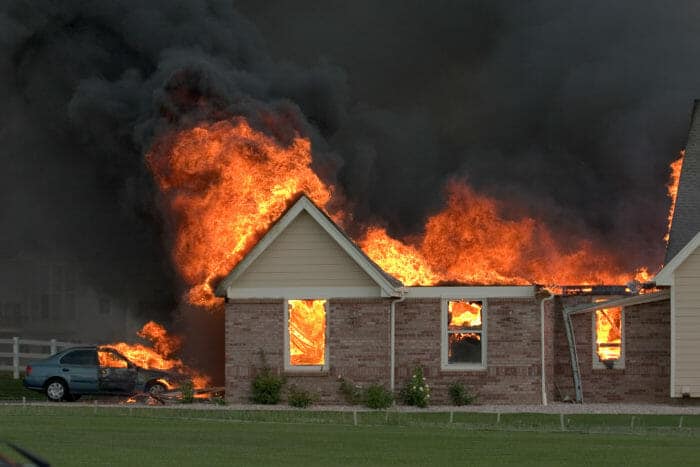
The US Fire Administration / FEMA recommends that you have a heat detector rather than a smoke alarm in your garage. Another location in a home where you should have a heat detector rather than a smoke alarm is the attic.
Smoke alarms are not designed for garages and attics and are much more likely to fail than a heat detector. Getting the right type of detector or alarm in the right places can save your home and your life.
What is the difference between a smoke alarm and a heat detector?
Smoke Alarms
Smoke alarms are designed to provide people an early warning sign of a fire so that they have time to escape the fire; they do this through sensing smoke and sounding an alarm.
Fire officials recognize that all fires are not alike, so at times, they break them down into two basic categories: 1) “Fast Flame Fires” and 2) “Smoldering Fires.”
Because of the basic differences between the two types of fires, smoke alarms are designed to react more quickly to one type than the other.
- Ionization type – Generally these alarms use “ions,” or electrically charged particles, to help detect smoke in the air and are considered best for “Fast Flame Fires.” Presently the majority of smoke alarms in the US are of this type; however, the trend is towards the combination type smoke alarm.
- Photo electric type – When smoke enters the optical chamber of this alarm and crosses the path of the light beam, some light is scattered by the smoke particles, directing it at the sensor and thus activating the alarm. Considered best for smoldering types of fires.
Combination type A combination or dual sensing alarm has both technologies incorporated into it; both the Ionization technology and the photo electric technology. The combination ones are usually the more expensive of the three types, however, they are becoming much more popular and in some building jurisdictions are now required. Smoke alarms have become increasingly important because times to escape a fire in a home have shortened tremendously. (Learn why)
Heat detectors
Heat detectors are designed to minimize property damage by a change in temperature caused by a fire and thought of as a protector of property. Heat detectors come in two basic types:
- One that recognizes the rate of temperature change and when the temperature changes too rapidly, it will trigger the alarm.
- The other has a specific set point in temperature that triggers the alarm. i.e 155 degrees Fahrenheit.
Heat detectors responds to the heat of a fire, not the smoke of a fire.
Reasons for Not using smoke alarms in garages and attics
Smoke alarms may fail in temperatures below 30 degrees or above 100 degrees Fahrenheit
The majority of smoke alarms manufactures recommend that their smoke alarms be used in areas where the temperature does not go below 30 degrees Fahrenheit or above 100 degrees Fahrenheit, for their product may not operate properly or may fail. Attics and garages both reach temperatures that are outside the range limitations of most smoke alarms. Note that there are a few manufactures who do make detectors for a wider range of temperatures i.e. they will go from -15 to + 200 degrees Fahrenheit.
Smoke alarms are more subject to particles and contamination
Garages and attics tend to have more dust and particles in the air than rooms of a house, for most homes have an air filter on their furnace or A/C system. These filters help keep a home’s air much cleaner than the air in the attic or garage. Additionally, there is a much less likelihood that insects and other small creatures will get into an alarm in the house than in the garage or attic.
Corrosive fumes are unlikely to be found in the house, but more likely to be found in the garage. Cans, bottles and containers with chemicals may leak or not have lids secured tightly down, thus slowly releasing toxic and corrosive fumes. Exhaust from car engines also contributes to the problem.
High humidity
High humidity in the air may falsely set off smoke alarms because many smoke alarms cannot distinguish between light smoke particles and heavy moisture particles in the air.
Heat alarms are engineered to be much less affected by the above conditions.
Tip
Avoid installing a heat alarm near fluorescent lights, for the electrical noise (interference) and flickering from the lights may affect the alarm’s operation. Also, be sure to read and follow the manufacturer’s installation instructions.
Bottom Line
The majority of us do not take the time to fully read the specifications and limitations of smoke alarms or even the installation instructions of the ones we install. Therefore, we often use the wrong product for what we want to accomplish. It would be wise to follow the advice of the professionals and the US Fire Administration; also it is important to remember that that codes may differ somewhat from one building jurisdiction to another.
It is important to remember that our garages and attics often reach temperatures below 30 degrees or above 100 degrees, especially our attics in the summer time. Secondly, many fires start in the garage and that is one of the reasons that building codes require fire rated doors and wall assemblies between the garage and the rest of the house.

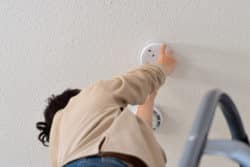

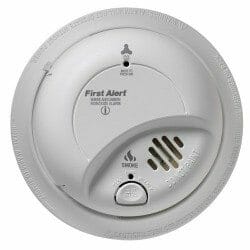
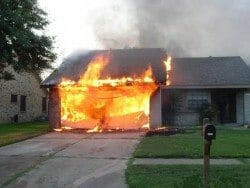
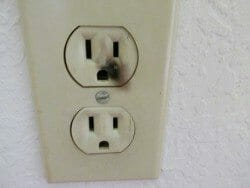
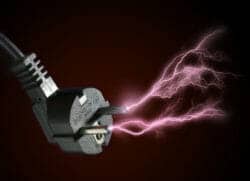
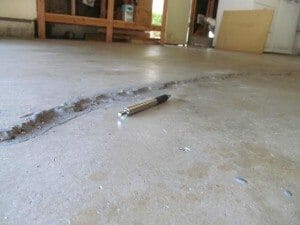
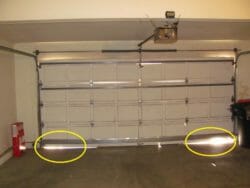

GOOD ARTICLES, WELL WRITTEN EASY TO UNDERSTAND, ISSUES EXPLAINED LIKE HIGH HUMIDITY SETTONG OFF A SMOKE ALARM